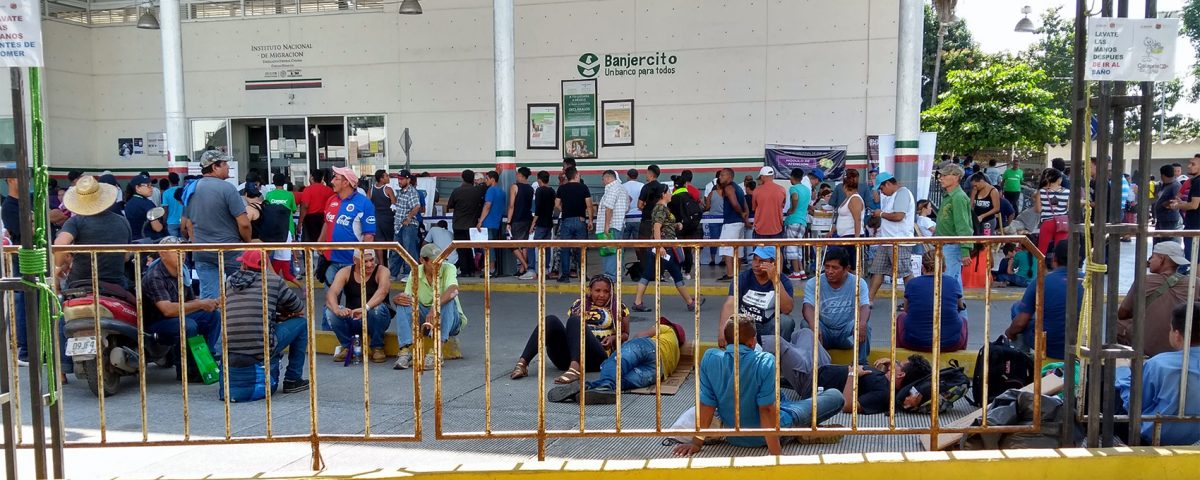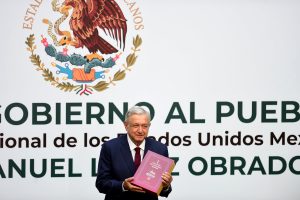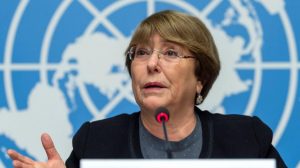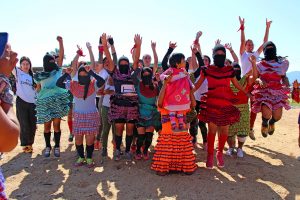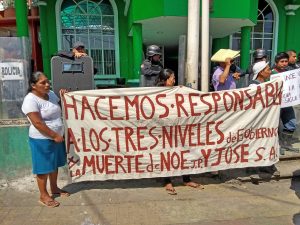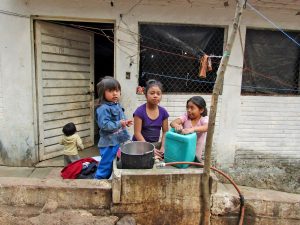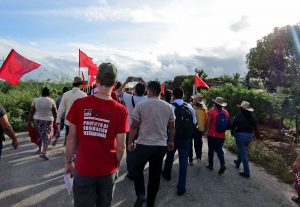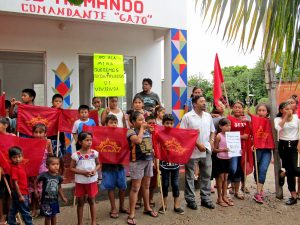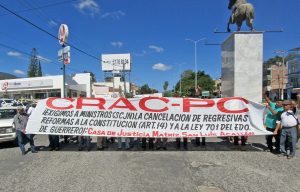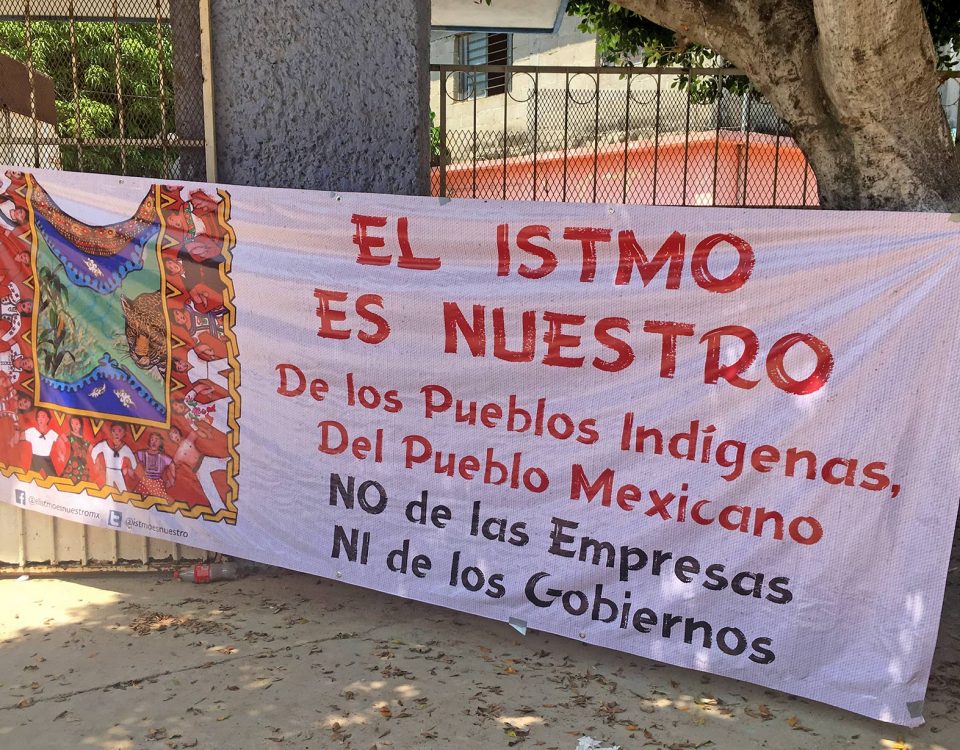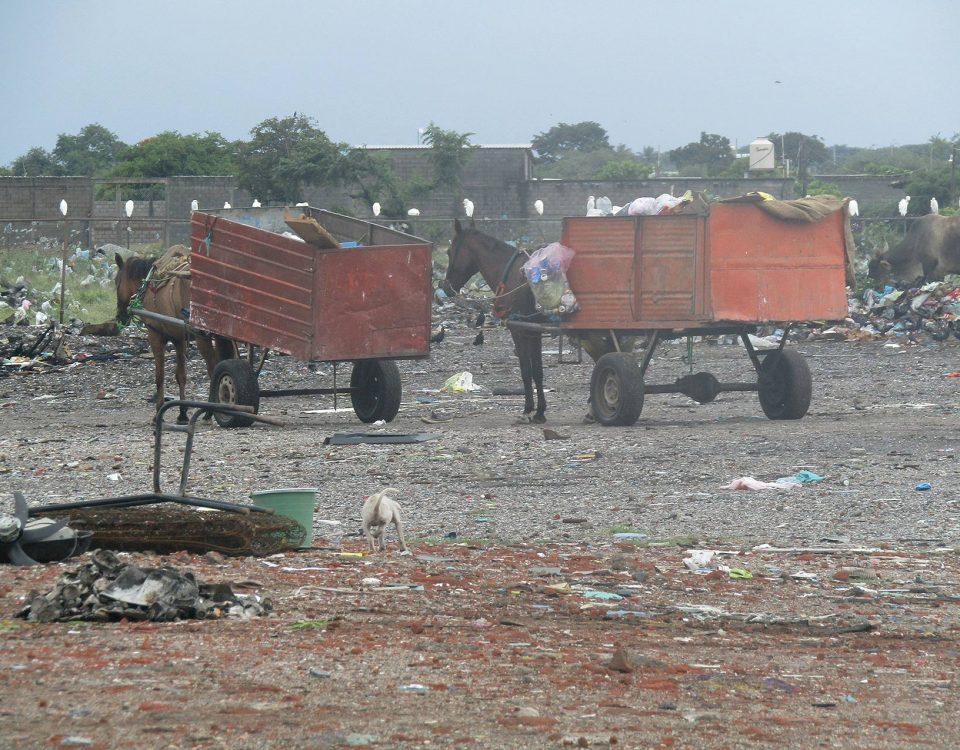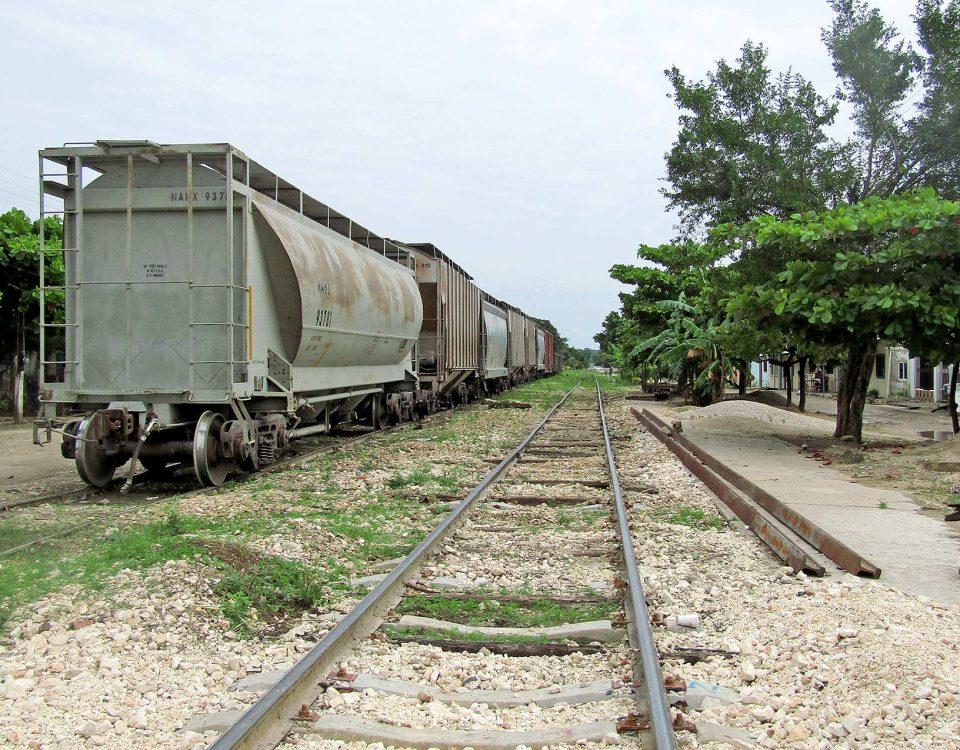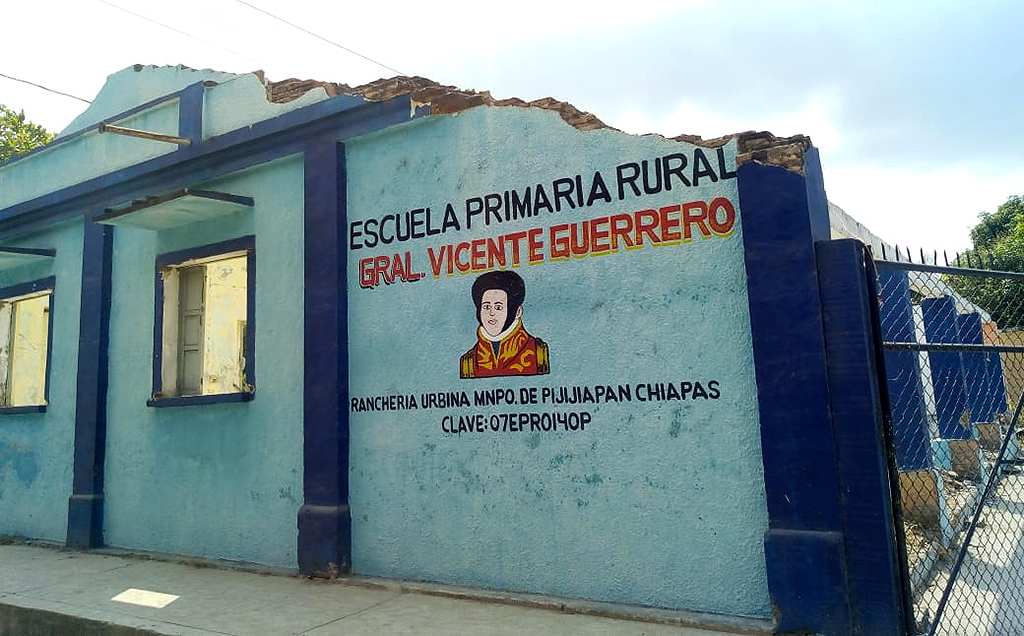
SIPAZ Activities (from mid-May to mid-August 2019)
27/09/2019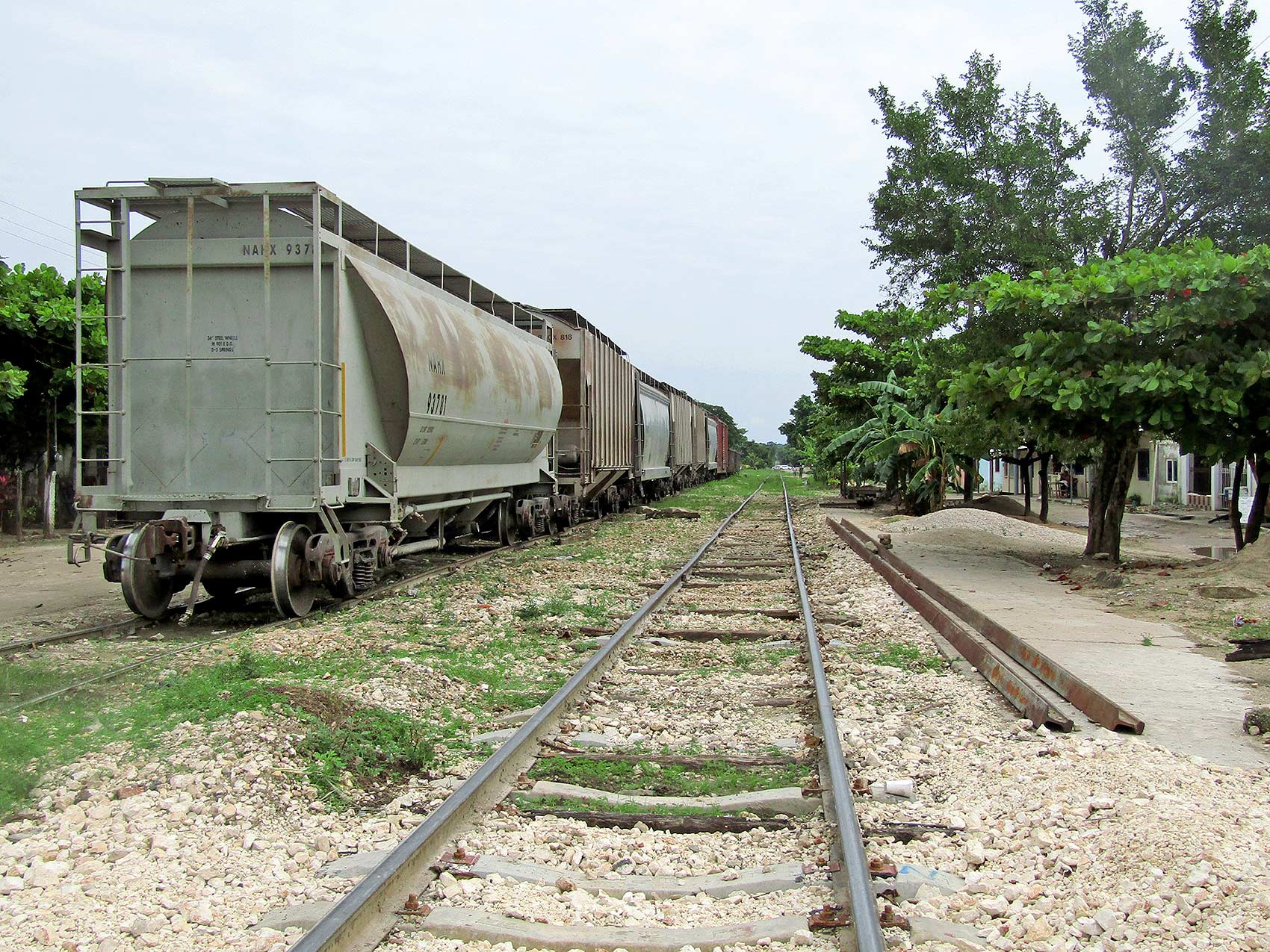
FOCUS: Mayan Train
19/12/2019September marked three months since the governments of Andres Manuel Lopez Obrador (AMLO) and Donald Trump reached an agreement in which Mexico undertook measures to lower the level of migration that crosses its territory to reach the United States.
According to the United States, the number of arrests on its southern border dropped by 56% in this period. The two governments stated that this reduction is due to the change in migration policy in Mexico- towards one of containment, which has included the deployment of the National Guard to the southern border area of Mexico, as well as a change of rules for migrants from Africa and Asia, which no longer allows authorization for them to travel through Mexico to the border with the United States.
These changes have generated extreme concern on the part of national and international organizations, as well as the United Nations, as the changes imply a resurgence of human rights violations against migrants. The agreement also includes another aspect that has generated controversy, the US policy called “Stay in Mexico,” which forces migrants to wait in Mexico during their asylum process.
In October, the Collective of Observation and Monitoring of Human Rights of the Mexican Southeast, urged the Mexican State to “respond with total respect and guarantee for human rights towards the migratory and refuge crisis that exists in the country, especially in the southern border, Including a definitive solution to overcrowding and inhuman conditions within the Migration Centres.” At present, the organization Without Borders, estimated that there were about 150,000 people detained in the 53 immigration centers throughout the country, plus another 50,000 returnees as part of the “Stay in Mexico” program.
Front Line Defenders and the All Rights for All Network (TdT Network) have also denounced that attacks against migrant rights defenders have intensified. They identified 69 events of detention, threats, harassment, defamation, aggression, deportation, surveillance or denial of entry to the country between October 2018 and September 2019, 41 of them in 2019. They urged the Mexican government to stop “the criminalization of migrant persons who organize to defend their human rights in their trajectories”, as well as “supervise and limit the actions of the National Guard regarding shelters and migrant detention centers.“
National: AMLO’s First Government Report, a “happy, happy, happy” country?
On September 1, AMLO presented his first Government Report. He referred to the need to continue fighting corruption, as well as to seek justice and equality. In the results of his austerity policy, he said that “in these first nine months we have achieved savings of 145 billion pesos.” He affirmed that “the Stock Exchange has remained stable; the economy is growing slowly but there is no recession, and now the distribution of income is less unfair.”
Regarding security, AMLO said that we still have to “work hard because the results are not good in terms of reducing crime (…) it is our main challenge”. He reported the deployment of 58,600 members of the National Guard and that “the goal is to deploy 140,000 members.”
Regarding human rights, AMLO stressed that “the State has ceased to be the main violator of human rights”, that “45 political prisoners have been released” and highlighted the government’s commitment to “meet the demands of truth, justice, reparations, and non-repetition for the victims.”
On migration, AMLO acknowledged that he had to change his strategy to avoid an economic confrontation with the United States, but did not give more information on the impact this change has had on human rights. He said that “this issue will be addressed without using force and coercion, but by creating work and welfare opportunities for people in their places of origin.”
Human rights: changes that have not been reflected in reality
In August, civil organizations presented the report “Defend Human Rights in Mexico: The End of Impunity?” The report notes that during the first months of AMLO’s government, violations decreased, although 41 events occurred that contain 331 acts of human rights violations, and the acts of individual violations towards defenders have increased. It noted that the measures remain “insufficient” and that it is clear that the issue is not a “priority” for the government. This same month, the Diagnosis of the Federal Protection Mechanism for Human Rights Defenders and Journalists prepared by the representation in Mexico of the United Nations High Commissioner for Human Rights (UNHCHR) suggested that there is a lack of resources to fulfill the promises which the government has made regarding human rights. This situation is exacerbated by the increasing number of beneficiaries due to the increasing number of attacks on journalists and defenders. Another source of concern is the involvement of public servants in cases (55%), suggesting that a strategy that “is part of a systematic policy” is required.
In September, the UN High Commissioner for Human Rights, Michelle Bachelet, expressed concern about the “terrible” situation of journalists and human rights defenders in Mexico. She expressed concern about the increase in violence in the country, in particular for femicides. She also addressed the issue of forced disappearances, with 40,000 missing and 23,000 bodies that remain unidentified. She recognized the announcement of the AMLO government to accept the competence of the UN Committee on forced disappearances to receive individual communications as a “step forward.”
In November, at the end of Mexico’s sixth periodic review of the implementation of the International Covenant on Civil and Political Rights (ICCPR), the UN Human Rights Committee issued 48 recommendations. Among the main ones, it gave the Mexican State a period of two years to “advance in the process of formation of the National Guard as a civil institution”. It expressed concern “for the militarized nature of law enforcement in general, including the National Guard, and for the lack of a clear timetable on the withdrawal of military force in citizen security tasks.”
In the same month of November, the Senate elected as the new head of the National Human Rights Commission (CNDH in its Spanish acronym) Rosario Piedra Ibarra, activist and daughter of the founder of the Eureka! Committee, an organization of relatives of disappeared persons. Opposition parties to the ruling National Regeneration Movement (MORENA), denounced that there was fraud in the process, and thus demanded the annulment of the vote. Furthermore, seven of the 56 candidates to preside over the CNDH also asked to replace her, saying that, “the process leaves questions of legality that must be remedied.” Four human rights groups and 128 victims from 12 states of the Republic called on the elected president not to take office “until there is a transparent process and without a shadow of a doubt.” Finally, between shouting and pushing, Rosario Piedra, considering her election “legitimate” and “legal,” was sworn in, insisting that she will be impartial, despite the fact that in the past she was a candidate for MORENA.
CNI and EZLN building other proposals
In September, the National and International Assembly “The Isthmus is Ours” was held in Juchitan, Oaxaca, at the invitation of the National Indigenous Congress (CNI in its Spanish acronym) and the Indigenous Government Council (CIG in its Spanish acronym). They explained that “we are here to analyze the onslaught of the patriarchal capitalist system and its megaprojects throughout the country and to strengthen especially the resistance struggles of the Isthmus and southern Mexico against the inter-oceanic corridor of the Isthmus of Tehuantepec, which aims to transform this region into an immense industrial park in the hands of transnational capital, and at the same time as a retaining wall against Central American migrants ordered by Trump.”
A Global Day to Fight in Defense of Life and Our Territories “SAMIR FLORES VIVE” was organized in October. It was named after delegate Samir Flores, an environmental activist who was murdered in February, and was planned as “a dislocated and forceful mobilization, throughout the country, against megaprojects of death, of an anti-capitalist and anti-patriarchal nature.”
In November, the Zapatista Army of National Liberation (EZLN in its Spanish acronym) invited people to participate in the “Combo for Life: December of Resistance and Rebellion” to be held in Chiapas in December. This event will include: the Second Edition of the Puy Ta Cuxlejaltic Film Festival; the first edition of “Dance Another World”; the Forum in Defense of Territory and Mother Earth; the Fourth Assembly of the CNI; the Second International Meeting of Women who Struggle; and, the celebration of the 26th anniversary of the beginning of the “war against oblivion.”
CHIAPAS: Vulnerability of defenders and journalists
In August, the body of Nora Patricia Lopez, environmentalist and head of the red macaw project of the Aluxes ecopark, was found in Palenque. Last June, environmentalist Jose Luis Alvarez Flores was also killed in that area. In January, activist Sinar Corzo Esquinca who was working in defense of the right to water in Tonala was murdered. There have also been threats and apprehensions against environmentalists in Tuxtla Gutierrez, Chilon, and San Cristobal de Las Casas.
In September, journalists and relatives of Mario Leonel Gomez Sanchez, a journalist murdered in Yajalon in 2018, demonstrated to demand the arrest of the intellectual authors. They denounced that one year after the murder, there is still no justice. The victim’s brother accused the State Attorney General’s Office (FGE in its Spanish acronym) of having been slow and negligent in the investigations. Although three people were arrested as alleged material perpetrators, he denounced that there is institutional cover-up and influence peddling in the case while he and his family have lived in fear “because those responsible are walking in the streets of Yajalón as if nothing had happened.”
In regards to advances, in November the former mayor of Amatan, Manuel de Jesus Carpio Mayorga of MORENA, was arrested by state police. He is accused of the murders of the members of the Independent Regional Peasant Movement-National Coordinator Plan of Ayala-National Movement (Mocri-CNPA-MN in its Spanish acronym), Noe Jiménez Pablo and Jose Santiago Gomez Alvarez last January. The activists had participated in protests to demand the dismissal of the mayor, by denouncing the cacicazgo of the Carpio Mayorga brothers, the arbitrariness of the municipal police in collusion with criminals, and the unfulfillment of public works, among others. Manuel de Jesus Carpio Mayorga and his entire cabinet had resigned as they were identified as possibly involved in the murders.
Internal forced displacement: human rights crisis remains in Los Altos
In September, a political agreement was reached that allowed the return of 13 displaced families in Ejido Puebla, municipality of Chenalho. Inhabitants of this town called for the release of Javier Gomez Gutierrez, a prisoner sentenced for murder in the context of the post-election issue of May 2016 that led to the displacement. They said that the return of the “self-displaced” has not been finalized since there is still another group in San Cristobal de Las Casas. Diego Cadenas, director of the Kuuntik Human Rights Center, who has accompanied this group, said that “13 displaced families returned (…) after paying a fine of 15,000 pesos per family, the same fine paid by the current municipal President Abraham Cruz Gomez from Chenalho, at the time one of the perpetrators of forced displacement. That the victims are required to pay a fine to their aggressors to be able to return to their community of origin, far from being an action that helps to avoid the repetition of the act, nstead results in an incentive to repeat displacement.”
In October, the CNDH issued a recommendation for “the conditions of violence, insecurity, constant risk, and lack of protection in the Municipality of Aldama, Chiapas, due to a dispute over possession of land with the Municipality of Chenalho, which resulted in the death of one person … and the displacement of several families.” Although the CNDH acknowledged some progress, “this has been insufficient” “since the acts of violence by various armed groups have not ceased.” It should be remembered that at the beginning of June, a non-aggression pact was signed between the two municipalities without ending the eradication of violence in the area.
In November, two years after the mass displacement of more than five thousand indigenous people from communities that are on the border between Chenalho and Chalchihuitan due to an old agrarian conflict between the two municipalities, the widow of Samuel Luna Giron, who was killed in October of 2017, as well as his family and friends demanded justice, as no one has been arrested for the murder. They also asked the authorities to comply with repatations for damages and dismantle the armed civil groups of Chenalho that continue to operate with impunity.
Other human rights issues
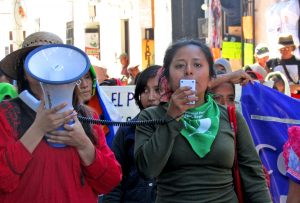
March in Chiapas in the framework of the International Day to End Violence against Women, November 2019 © SIPAZ
In August, the Popular Campaign against Feminicide in Chiapas expressed its “repudiation” for the “lack of commitment of governments (…), given the serious increase in feminicidal violence.” It reported that so far in 2019 there have been 120 violent deaths of women, of which only 49 have been classified as femicides. Although since November 2016, a Gender Violence Alert (GVA) has been activated in the state, “the alarming figures quoted” can only be explained by “the lack of interest of the authorities.” It demanded, among other things, that the authorities tackle femicidal violence as a social, cultural, and political problem that requires concrete and urgent action and that the GVA be extended to all the municipalities of the entity.
In November, civil organizations expressed their concern about the militarization of the municipality of Chicomuselo. One year after the inauguration of the military headquarters in said municipality, they denounced that the function of the military base has been “to intimidate the mining resistance that exists in the communities, as well as to monitor the work carried out by the defenders of the territory.” They said that despite the arguments to justify their presence, “thefts and robberies have not been reduced.” They noted that since August, after the announcement of the EZLN to create new Autonomous Municipalities, one of them in Chicomuselo, “military tours have been reported.”
OAXACA: Systematic attacks on human rights defenders
In October, 17 months after the forced disappearance of defender Ernesto Sernas Garcaa, the World Organization Against Torture (WOAT) denounced the inaction of the Mexican State in the case. It called on the authorities to start an effective search to find his whereabouts. According to the Front Line Defender organization, the disappearance of the lawyer “coincided with a crucial moment in a criminal process in which he legally represented 23 defenders [of the Red Sun/Sol Rojo organization], whose detention in 2015 was declared arbitrary by the Group of Work on Arbitrary Detention of the United Nations.”
In November, Fredy Garcia Ramirez, a member of the Committee for the Defense of Indigenous Peoples (CODEDI in its Spanish acronym), was arrested. According to the Prosecutor’s Office, the arrest derives from an arrest warrant for events that occurred a few weeks earlier in the community of Santiago Xianica, where two members of the state police were allegedly tortured and a member of the State Investigation Agency died. Front Line Defenders expressed its “serious concern” for this detention when “the use of fabricated crimes has become an effective strategy to intimidate those who work for human rights in Oaxaca.” The Observatory for the Protection of Human Rights Defenders stated that “it is not an isolated incident, but is part of a pattern of systematic attacks against CODEDI in the last 21 months, including five murders, two assassination attempts, six arbitrary detentions, three incidents of raid and robbery, as well as permanent threats and the militarization of the area where the (…) CODEDI is located.”
Another situation that raises concerns about human rights happened in August, one year after the Gender Violence Alert (GVA) was issued in 40 municipalities in Oaxaca, when several organizations reported that 126 women were killed in this period. They consider that this figure implies that the GVA “did not make a difference” when 60% of the cases occurred in municipalities that have it. They called on the governor to meet immediately with the municipal presidents of the state to apply the GVA. They also asked to make public the budget for its implementation as well as a detailed report of its results.
In matters related to land and territory, one year after the flood of the Jalon dam due to heavy rains, in October, the inhabitants of Magdalena Ocotlan denounced that the authorities have not seriously addressed the case. Although there was a penalty of 800 thousand pesos to the company, they believe that to date the toxic sludge continues to pollute the river and generate diseases. The Canadian company Fortuna Silver Mines, which has 26 mining concessions in 35 municipalities of the Central Valleys of Oaxaca, including the Cuzcatlan Minera, rejected “the false accusations” and affirmed to comply with “the legislation and provisions on fiscal, environmental, health, labour, and social matters” They also plan to expand the access of the same mining company to more than seven thousand hectares. The municipal president of Ocotlan demanded the cancellation of the permits for this extension as well as the immediate attention of the problems caused by the spill.
GUERRERO: Ayotzinapa and the “rot” of the justice system
In September, the Subsecretary of Human Rights of the Interior, Alejandro Encinas, reported that 24 defendants were released for their alleged participation in the disappearance of the 43 students of the Normal Rural School of Ayotzinapa in Iguala, in 2014. He added that 77 people of the 142 that had been arrested were released. He stated that this constitutes an “affront to victims and parents, and a mockery of justice” and that it ” shows the misery, the rot in which the justice system in the country is located.”
In November, the families of the 43 held a meeting with President AMLO and members of the Truth and Access to Justice Commission for the case. The president endorsed his commitment to do everything possible to find the whereabouts of the students. Alejandro Encinas, said that the case file is in “a process of total reconstruction (…) suffers from many failures in the way it was integrated.” He said that the Attorney General’s Office (FGR in its Spanish acronym) is preparing material to declare the officials involved in the construction of the case. Shortly after, several unknown subjects intentionally set fire to the facilities of the former municipal police command in Iguala, where documents related to the disappearance of the 43 were kept.
Human rights defenders: At permanent risk
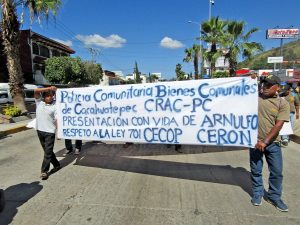
Demand for the appearance alive of activist Arnulfo Ceron, CRAC PC demonstration in Chilpancingo, Guerrero, November 2019 © SIPAZ
In September, the Cocula union leader and community activist, Oscar Hernandez Romero, disappeared. The United Steelworkers (USW) union in the United States announced that “Hernandez opposed the Canadian mining company Torex Gold Resources, which in 2018 banned a campaign to organize miners” of the Media Luna mine. “Such a campaign was suspended after three supporters [of unionization] were killed. And so far no one has been arrested,” it added. The union stated that “the Mexican government must act immediately to locate Oscar Hernandez Romero and investigate the murder of the workers.”
In October, civil organizations expressed their “deep concern” over the statements of the former Attorney General of the State of Guerrero, Iñaki Blanco Cabrera, against the lawyer of the La Montaña “Tlachinollan” Human Rights Center, Vidulfo Rosales, “whom he accuses of obstructing the investigations and profit with the defense of the families of the 43 disappeared student teachers.” They affirmed that the statements intend to “divert attention and thus prevent the state authorities of Guerrero from being investigated.”
On November 20, the body of the activist and leader of the Popular Front of the Mountain (FPM in its Spanish acronym), Arnulfo Ceron Soriano, who had been missing since October 11, was found in Tlapa de Comonfort. Tlachinollan regretted that the case was not addressed immediately, but rather until it escalated internationally: “This lack of due diligence in the first hours that followed the complaint, added to the context of macrocriminality, extreme violence, corruption, and impunity that characterize the state of Guerrero make this case very complex.”
In November, the Regional Coordinator of Community Authorities – Community Police (CRAC-PC in its Spanish acronym) denounced the criminalization and persecution of its members by the judiciary after the “counter reform promoted by the State Government that repealed the legal provisions (…) referring to the powers of the CRAC-PC to seek to impart and administer justice, a circumstance that undermines our community institution and generates an permissible framework for the criminalization and prosecution of our regulatory systems.”

